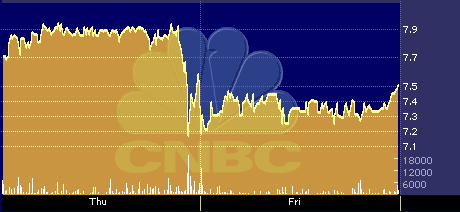
TiVo Soars But Challenges Remain
Silicon Valley Correspondent
TiVo, Inc.’s {TIVO} stock has tripled after the company’s IPO. But some analysts question if the interactive TV company is worth the price of admission to investors.
Among the concerns voiced by analysts: the inability of TiVo to fend off competitors; a lawsuit from TiVo’s own investors; and a lack of interest from consumers asked about TiVo by a promient research group.
But one prominent analyst thinks TiVo is a strong stock down the road.
“I knew this was going to be a big one,” says Josh Bernoff, an analyst at Forrester Research based in Cambridge, Massachusetts. “This company is going to change the world of TV forever. Their product is going to be the hottest launch in history, and it’s starting this year.”
Currently, investors agree with Bernoff. The company’s stock, which was initially priced between $11 and $13 a share, soared 162 percent at the open on Thursday, and was trading at $33.88 this morning.

TIVO two-day stock performance chart
Sunnyvale, California-based TiVo sells a $10 monthly subscription service to consumers who buy TiVo’s next-generation digital video recorder, often called a personal video receiver. The receiver that stores 14 hours of information costs $499 and a 30 hour receiver is available for $999.
TiVo’s machine lets users take more control over their TV viewing. TV programs can be paused, say, to take a telephone call, and then restarted without missing anything.
TiVo’s product also helps locate TV programs of particular interest to viewers. If a viewer records Star Trek one day, for example, TiVo’s product automatically searches out and records other Star Trek episodes whenever they’re broadcast.
It’s the ability to zap out commercials, however, that may be TiVo’s most attractive feature.
“It certainly has the broadcasters worried,” says Jim Penhune, an analyst at the Yankee Group based in Boston, Massachusetts. “Essentially, viewers can set up their own personal networks, watching whatever they want whenever they want, without the commercials.”
Traditional broadcasters are responding to TiVo’s challenge by following an old adage: “Keep your friends close, but your enemies closer.”
The company’s equity investors include CBS {CBS}, Comcast Corporation {CMCSK}, Cox Communications {COX}, Discovery Communications Inc., and The Walt Disney Company {DIS}, among others. (NBC, the parent network of CNBC TV and CNBC.com, also owns a stake in TiVo.)
Ironically, several of TiVo’s investors are also part of a group that recently threatened to sue the company, maintaining that TiVo’s machines improperly rebroadcast legally protected material.
“I think that will all get sorted out eventually,” says Bernoff of Forrester Research. “TiVo is able to deliver something broadcasters want, which is more personalized information about individual viewing habits. Both sides need each other,” he says.
One thing that seems less certain, analysts say, is whether TiVo will be able to fend off competitors selling knock-off boxes or similar services.
“There’s really not much of a barrier to entry in their market,” says Penhune of the Yankee Group. “These are features that could easily be built into something else.” Future generations of digital cable TV set-top boxes or DVD players, for example, might incorporate similar technology.
In parts of Europe, for example, TPS, a leading cable TV firm, already offers personal video recording services as an added feature to subscribers.
“It’s a very similar technology embedded in set-top boxes,” says Brumfield of Broadband Intelligence. “But that might not be easily replicated here.” Given the relative lack of coordination among U.S. cable TV firms, Brumfield says, TiVo has a chance to take advantage of its “first-mover” status.
Penhune of the Yankee Group says the next 12 months are absolutely critical for TiVo. If TiVo’s sales don’t grow rapidly, he says, the market could become fragmented with many suppliers, including DVD makers and others, jockeying for position.
There is at least some reason to worry that TiVo’s sales may not take off as quickly as some investors apparently expect.
About 64 percent of 750 consumers recently surveyed by the Yankee Group, for example, said they were “not at all interested” in owning a $499 product offering TiVo’s features. Oddly, though, 86 percent of the same survey group said they were either “very interested” or “somewhat interested” in the ability to skip commercials.
“Consumer surveys are always problematic when it comes to new technologies,” says Brumfield of Broadband Intelligence. “You really can’t test the acceptance of a technology that is yet to be introduced.”
Bernoff, of Forrester Research, says competition from other companies, such as clone makers, selling similar boxes probably won’t matter. Instead, he says, the battle for dominance in the personal video recorder market will come down to which company has the best user interface.
“In the end, that’s what’s worth investing in here. TiVo will succeed by having their technology built into other devices.”
Bernoff says TiVo’s more advanced features, such as the ability to automatically identify and record programs of interest, give the company a critical competitive advantage. “That’s defensible intellectual property.”
So, is the stock worth it’s post-IPO price?
Bernoff thinks so. “TiVo will be an important media company in charge of a large number of eyeballs,” he says. “Compared to other over-valued technology stocks, this certainly is a company that has a much better chance of matching its over-valuation.”
Not counting TiVo’s own investors, the firm’s main competitor is Mountain View, California-based Replay Networks, Inc., whose investors include Time Warner, The Walt Disney Company, NBC, Showtime Networks Inc., and Matsushita Kotobuki Electronics Industries, Ltd., a subsidiary of Matsushita, among others.
TiVo reported revenues of $8,000, and a net loss of $11.6 million, for the six months ending June 30, 1999.


